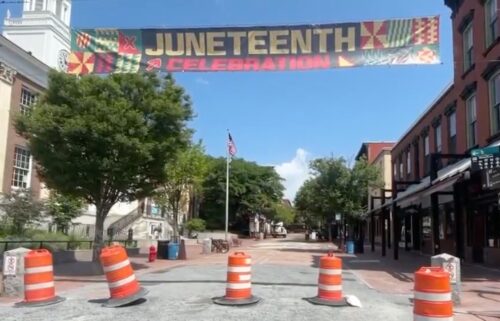Judge sides with Newsom, orders National Guard to leave California
SAN FRANCISCO (KTVU-TV) -- A federal judge ruled in favor of California Gov. Gavin Newsom on Thursday and granted a temporary restraining order directing President Trump to return control of the National Guard to the governor.
The legal showdown between Newsom and Donald Trump took center stage in a federal courtroom in San Francisco.
The issue: Whether Trump had the legal authority to send in the California National Guard and U.S. Marines to quell the anti-ICE protests in Los Angeles without the consent of the governor.
Ultimately, U.S. District Judge Charles Breyer ruled that Trump does not have that power.
Breyer said the deployment of the Guard was illegal and both violated the Tenth Amendment and exceeded Trump's statutory authority.
"This country was founded in response to a monarch, and the Constitution is a document of limitations. I'm trying to figure out where the lines are drawn," Breyer said before a packed courtroom.
Breyer said the National Guard must leave on Friday.
Newsom said on social after the ruling, "The court just confirmed what we all know: The military belongs on the battlefield, not on our city streets. End the unnecessary militarization of Los Angeles now, @realDonaldTrump,"
Newsom filed a lawsuit this week, arguing that Trump does not have the constitutional power to federalize the military without his consent and coordination.
Trump previously said he indeed had the power to call in the military to protect federal buildings, property and personnel.
Newsom's argument
Newsom argued in a 22-page lawsuit against President Donald Trump and Secretary of Defense Pete Hegseth that the president has invoked emergency powers to "exceeds the bounds of lawful executive authority," and that Americans should be governed by civil, not military rule.
Newsom and California Attorney General Rob Bonta wrote to the court that Trump had wrongly invoked something called Title 10 to send in 4,000 California National Guard troops to Los Angeles after protests broke out there, some of which got destructive, to quell the crowds. And in fact, Newsom's team argued, it was the federal ICE agents who inflamed tensions, not the protesters.
While there have been some pockets of protester unrest, Newsom's team wrote: "At no point in the past three days has there been a rebellion or insurrection."
Nor have the protests risen to the level of protests or riots that Los Angeles and other major cities have seen at points in the past, they argued.
The last time the National Guard was federalized for riot control was in 1992 – at the governor's request – during the Rodney King riots.
Newsom and Bonta called this an "unprecedented usurpation of state authority." And their legal argument centers on the fact that the president's "federalization and deployment" of the National Guard for "reasons not authorized by law and without input or consent from the governor contravenes core statutory and constitutional restrictions."
The Constitution, they argue, reserves the right of states to determine when to bring in the military, unless the state requests or consents to federal control.
"Only under the most exigent of circumstances can the president, over the objections of a state," call the National Guard into federal service, Newsom's team said. This how the only way to check "federal overreach," they argued.
Trump's argument
Trump was represented by Asst. Attorney General Brett Shumate, and other members of the Department of Justice, Eric Hamilton, Alexander Haas, Christopher Edelman, Garry Hartlieb and Benjamin Kurland.
They argued that Newsom engaged in a "crass political stunt endangering American lives," as he tried to stop the President of the United States from "exercising his lawful statutory and constitutional power to ensure that federal personnel and facilities are protected."
Trump's team said in a 59-page court filing filed Wednesday that the reason the president had the authority to bring in the National Guard is because there have been "violent rioters" in Los Angeles, who have vandalized buildings and property, and injured law enforcement officers, which the Los Angeles Police Department has not been able to quell.
Trump's legal team cited what LAPD Chief Jim McDonnell said at a news conference, where he told the public that "things have gotten out of control" and warned that "somebody could easily be killed."
Because of that, either that the local police were "unable or unwilling to control" the crowd, Trump responded by using the authority vested in him by statute and the Constitution to federalize and deploy the California National Guard to protect federal personnel and property, quell the mobs, and restore order," Trump's lawyers wrote to the judge.
Trump properly invoked his statutory authority to federalize the California National Guard, a sensitive judgment that the president holds by law and to "which the courts owe the highest deference."
The statute, technically called Title 10 USC 12406, empowers the president to determine what forces "he considers necessary to suppress a rebellion or to execute federal laws."
And in terms of the Marines and the National Guard, Trump's team said they are not engaged in law enforcement, rather than "protecting law enforcement."
And in fact, Trump's team wrote, Newsom has not provided any evidence otherwise, only a "speculative assertion" that both branches of the military "will be unused for unlawful purposes in the future."
Legal experts
UC College of the Law Professor David Levine told KTVU that the judge had a "very tricky" situation to decide.
And in the end, Levine guessed that the judge wouldn't make either side completely happy.
"I think he's going to ask very skeptical questions of both sides," Levine said. "I think he's going to try and strike a middle path."
Politics outside the courtroom
The issue is playing out outside the courtroom as well.
Newsom made speeches and spoke to the New York Times podcast, the Daily, making his arguments. And the president did the same, telling reporters outside the Kennedy Center on Wednesday night that if he didn't send in the troops, Los Angeles would be "burning to the ground," and issuing statements on Truth Social, taking barbs at the governor.
For Trump, it's another chance to battle with Newsom, a frequent foil who leads a heavily Democratic state the president has long criticized.
And for Newsom, the feud has handed him a national platform as a beleaguered Democratic Party seeks a leader able to resist Trump.
The Source
- Court filings by Newsom and Trump, legal expert, the Associated Press



